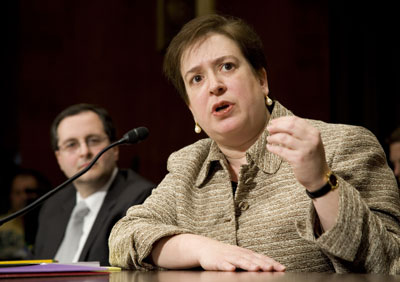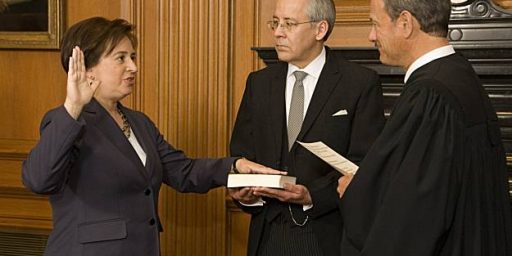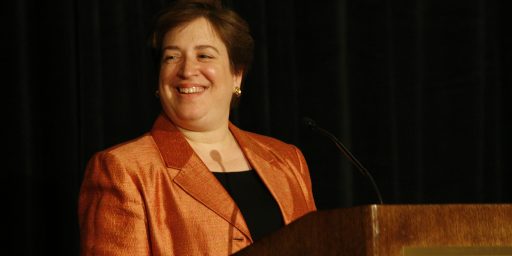Elena Kagan Changes Mind on Supreme Court Confirmation Candor
 People are having fun with reports that Elena Kagan, who argued as an advisor during the Ruth Bader Ginsburg confirmation that Supreme Court nominees should be required to give very detailed answers to policy questions, has changed her position now that the shoe is on the other foot.
People are having fun with reports that Elena Kagan, who argued as an advisor during the Ruth Bader Ginsburg confirmation that Supreme Court nominees should be required to give very detailed answers to policy questions, has changed her position now that the shoe is on the other foot.
Kagan wrote in 1995 that the confirmation process had become a “charade” because nominees were not answering direct questions, and said they should have to do so.
But during a briefing with reporters in the White House, Ron Klain, a top legal adviser to Vice President Joe Biden who played a key role in helping President Obama choose Kagan, said that she no longer holds this opinion. Klain pointed to Kagan’s testimony during confirmation hearings for her current job as solicitor general, the government’s top lawyer. “She was asked about it and said that both the passage of time and her perspective as a nominee had given her a new appreciation and respect for the difficulty of being a nominee, and the need to answer questions carefully,” Klain said, prompting laughter from a few reporters.
“You will see before the committee that she walks that line in a very appropriate way. She will be forthcoming with the committee. It will be a robust and engaging conversation about the law, but she will obviously also respect the conventions about how far a nominee should or shouldn’t go in answering about specific legal questions,” Klain said.
During her confirmation hearing on Feb. 10, 2009, Kagan was questioned about her 1995 law review article by Sen. Orrin Hatch, Utah Republican, who restated to Kagan the position she took about the need for answers to specific questions, and expressed concern that this would violate the judicial obligation to impartiality. “I’m not sure that, sitting here today, I would agree with that statement,” Kagan said, referring to her own opinion from 14 years prior. “I wrote that when I was in the position of sitting where the staff is now sitting, and feeling a little bit frustrated that I really wasn’t understanding completely what the judicial nominee in front of me meant and what she thought,” Kagan said, referring to her time on Biden’s staff in 1993 when he was chairman of the Senate Judiciary Committee.
Kagan helped Biden with the confirmation hearing of Justice Ruth Bader Ginsburg. In her law review article, Kagan said Ginbsurg used a “pincer movement” to evade being pinned down about her views on specific topics.
I’m reminded of an Al Franken bit on “Saturday Night Live” from 30 years or so ago. Jimmy Carter had brought back Selective Service registration and Franken said that, while he was vehemently opposed to the draft back in the 1960s, when he was eligible to be called, now that he was “older and wiser,” he had come to see the benefits.
It’s worth noting, however, that Kagan publicly stated her new position before it became clear that she was a frontrunner for an appointment to the High Court. That would seem to take charges of hypocrisy off the table.
Further, it’s a very thorny question. On the one hand, the Senate is charged by the Constitution with the duty to advise and consent on judicial nominees. And they can’t do their job properly without strong insights into how the nominee thinks about the law and how they would work through the balancing of conflicting Constitutional interests that are currently open questions. Or their willingness to ignore established precedent in favor of their own reading of the Constitution. On the other hand, the judiciary is a coordinate branch of government and forcing prospective Supreme Court justices to foreshadow their rulings makes them beholden to the Senate, compromising the independence of the Court. One could easily argue that, having signaled that they would vote a certain way in order to get confirmed, voting the other way would make them subject to impeachment. That’s untenable.
My own preference is somewhat closer to 1995 Kagan than 2009 Kagan, granting that the latter is so vaguely stated that it’s as hard to pin down as nominee Ginsburg’s judicial philosophy. Nominees don’t owe the Senate specific answers on how they would vote on specific cases. They do, however, owe the Senate — who represent the people of the several states — detailed insights into their legal philosophy.






Close scrutiny of a nominee’s legal philosophy tends to produce nominees whose views are inscrutable. Is that a good thing? It’s notoriously difficult to handicap the performance of a Supreme Court justice before he or she takes office anyway.
I take the old-fashioned view that a president’s nominations to the Supreme Court should be given substantial deference. That’s another way of saying that Democrats who voted against the confirmation of Roberts erred and Republicans who voted against the confirmation of Sotomayor erred.
I think that’s a different question.
I absolutely agree that presidential nominees should be presumptively confirmed, as I view “advise and consent” as basically a check against cronyism. So long as the nominee is morally fit and technically qualified, they should be confirmed.
With respect to lifetime appointment to the body that sits as an effective running Constitutional Convention, I think closer scrutiny is warranted. But, so long as they demonstrate that they’re intellectually up to the job and aren’t so ridiculously out of the mainstream as to be a nuisance on the bench, they should get confirmed.
I pretty much agree with Dave.
Additionally, I don’t see how a nominee can be forced to be specific on anything and I don’t see this as a problem. The Senate can always refuse to confirm nominees who aren’t forthcoming. Therefore, I think the “problem,” if it exists, isn’t with nominees, it’s with the Senate.
Kagan’s 1995 position was that the Senate should withhold confirmation from nominees that refused to answer questions. That strikes me as reasonable.
Since 1970 the average life term of a Justice has been 25.6 years compared with 14.9 years before that. I don’t think we can afford to be deferential when a life term is essentially being doubled.
No, it’s the same question. The nexus of my comment, your views on nominees answering questions, and Stephen’s post on limited terms for Supreme Court justices is this observation of yours:
If Supreme Court justices weren’t legislating from the bench, the policy preferences and legal philosophy of the nominees would be much less pressing concerns. I honestly don’t believe it was supposed to be this way.
I think the Founders envisioned a system in which the courts did not have a monopoly on interpretation which was the prevailing model when the Constitution was written. The courts have usurped so much power that it has created a condition which I suspect will be found to be untenable.
Absolutely right. But I don’t know how to put that horse back in the barn. SCOTUS abrogated that power in 1803 and the other branches have acquiesced since.
Then there is Federalist 78:
Alexander Hamilton, the author, was a fan of a much stronger central government — and Supreme Court — than was actually agreed to in the text of the Constitution itself. There’s a reason that judicial review isn’t outlined in Article III and such minor powers as granting patents or running a postal service is articulated in Article I.
But do you really think that even Alexander Hamilton’s view of a centralized government is anywhere close to being as expansive as what we have now?
After all, they are called the Federalist Papers.
Things certainly evolved away from the Founding ideals. But, then, that was my point to begin with.
” The courts have usurped so much power that it has created a condition which I suspect will be found to be untenable.”
From my POV, this just as much Congress failing to live up to its responsibilities. Our government is overly dominated by the executive branch, with the Congress existing to pass that which the POTUS wants passed. Many of the laws passed by Congress are vague, so that the courts do have to make law. If you really read what Sotomayor was saying, she was correct about courts making law. (Who decides what “reasonable” means in all of those laws they pass?) This is largely, I believe, a result of party affiliation dominance, which Washington knew would be a problem.
Steve